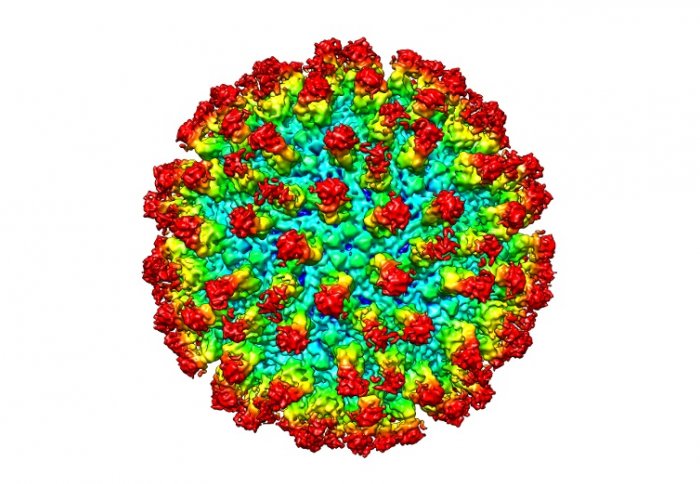New class of antibodies raises hope of dengue fever vaccine
by Sam Wong

Human antibodies binding to a dengue virus particle.
Scientists have discovered a new class of human antibodies against the dengue fever virus, which could be exploited to develop a vaccine.
Dengue fever cases have risen dramatically in recent decades as the disease has spread to new areas. An estimated 390 million infections occur each year, with around 40 per cent of the world’s population living in areas at risk. In most cases it causes flu-like illness, but in some patients it develops into dengue haemorrhagic fever, which can lead to shock, haemorrhage and death.
Studying blood from people infected with dengue in southeast Asia, researchers at Imperial College London examined the antibodies produced by the patients’ immune systems. Antibodies are large proteins that recognise specific parts of foreign objects such as bacteria and viruses and signals to other parts of the immune system to attack the invader.
The researchers identified a new class of antibodies that is effective against all four strains of dengue virus. These antibodies could themselves be used to protect against or treat infections; or vaccines could be devised to stimulate the body to produce these antibodies.
The study, reported in the February issue of Nature Immunology, was led by Professor Gavin Screaton and Dr Juthathip Mongkolsapaya in the Department of Medicine at Imperial in collaboration with Dr Felix Rey and his colleagues at the Institut Pasteur in Paris. In a second paper, published in Nature, the researchers analysed the antibodies’ structure, which is of crucial importance for vaccine development.
Professor Screaton said: “The incidence of dengue continues to increase despite attempts to control its spread. Outbreaks of dengue put huge stresses on the healthcare systems of endemic countries and a vaccine is desperately needed to check the disease. Current vaccine trials have shown some promise but do not fully protect from infection. The finding of this new class of antibodies points the way for a new approach to a dengue vaccine design which we are pursuing.”
Rather than binding to a single protein on the surface of the virus, these antibodies target a molecular bridge between two proteins. Although the four strains of dengue virus have variations in their surface proteins, the molecular bridge is the same, enabling the antibodies to neutralise all the different types. A vaccine containing the bridge, or a closely similar molecule, could work by training the immune system to recognise and attack dengue viruses.
The research was funded by the Medical Research Council, the Wellcome Trust, the National Institute for Health Research Imperial Biomedical Research Centre, the US National Institutes of Health and the European Commission Seventh Framework Programme.
References
Wanwisa Dejnirattisai et al. ‘A new class of highly potent, broadly neutralizing antibodies isolated from viremic patients infected with dengue virus.’ Nature Immunology 16, 170–177 (2015) doi:10.1038/ni.3058
Alexander Rouvinski et al. ‘Recognition determinants of broadly neutralizing human antibodies against dengue viruses.’ Nature (2015) doi:10.1038/nature14130
Article supporters
Article text (excluding photos or graphics) © Imperial College London.
Photos and graphics subject to third party copyright used with permission or © Imperial College London.
Reporter
Sam Wong
School of Professional Development